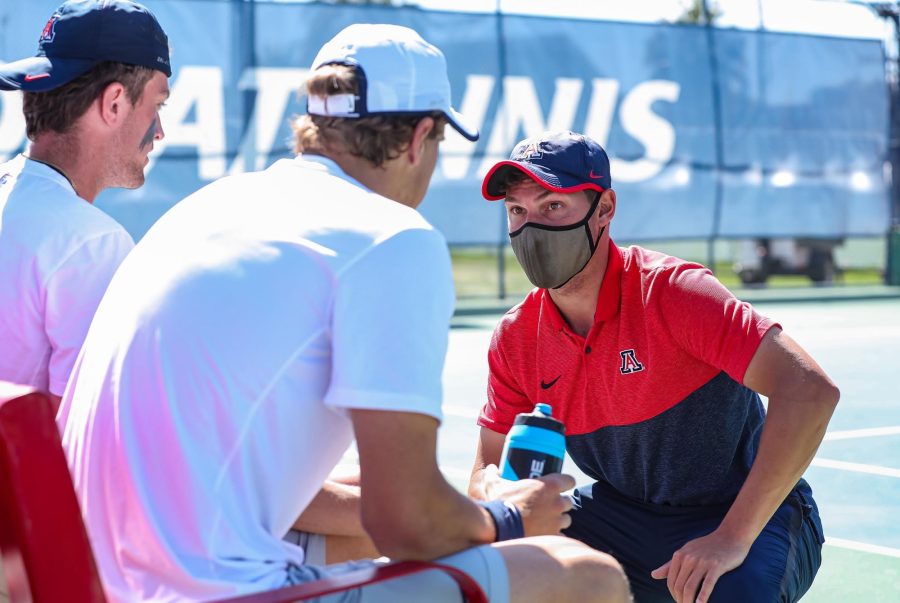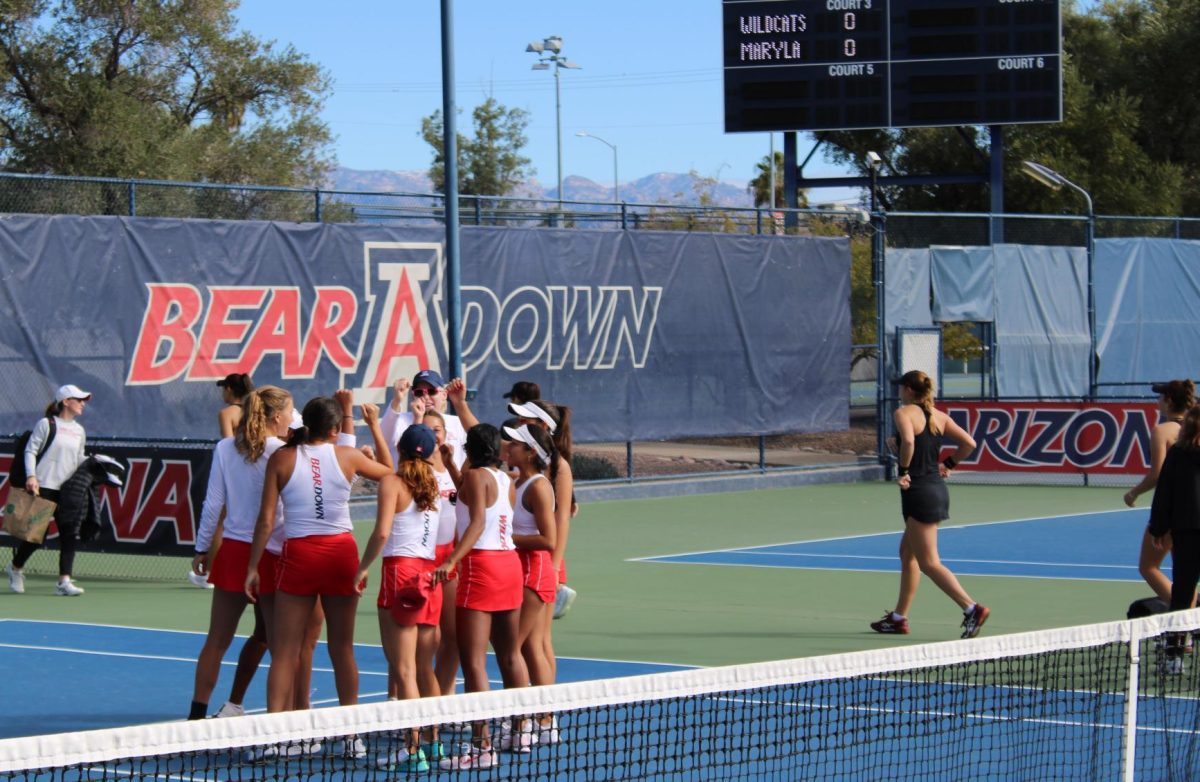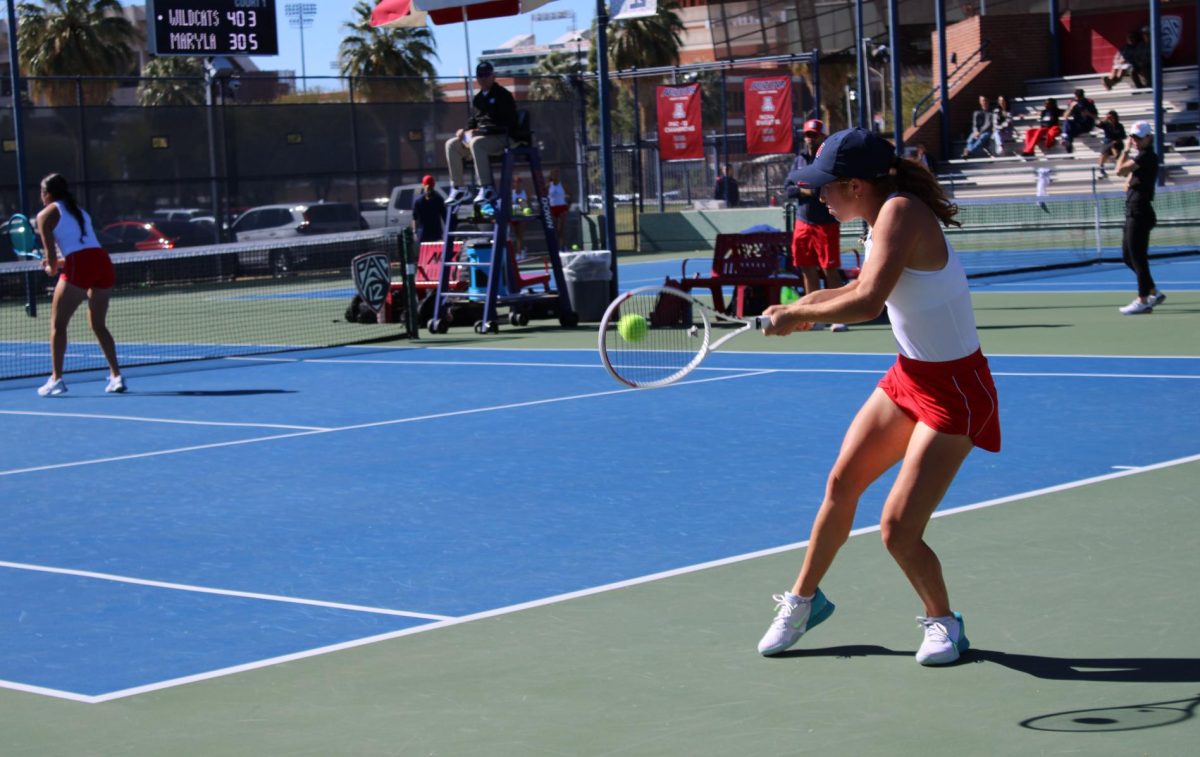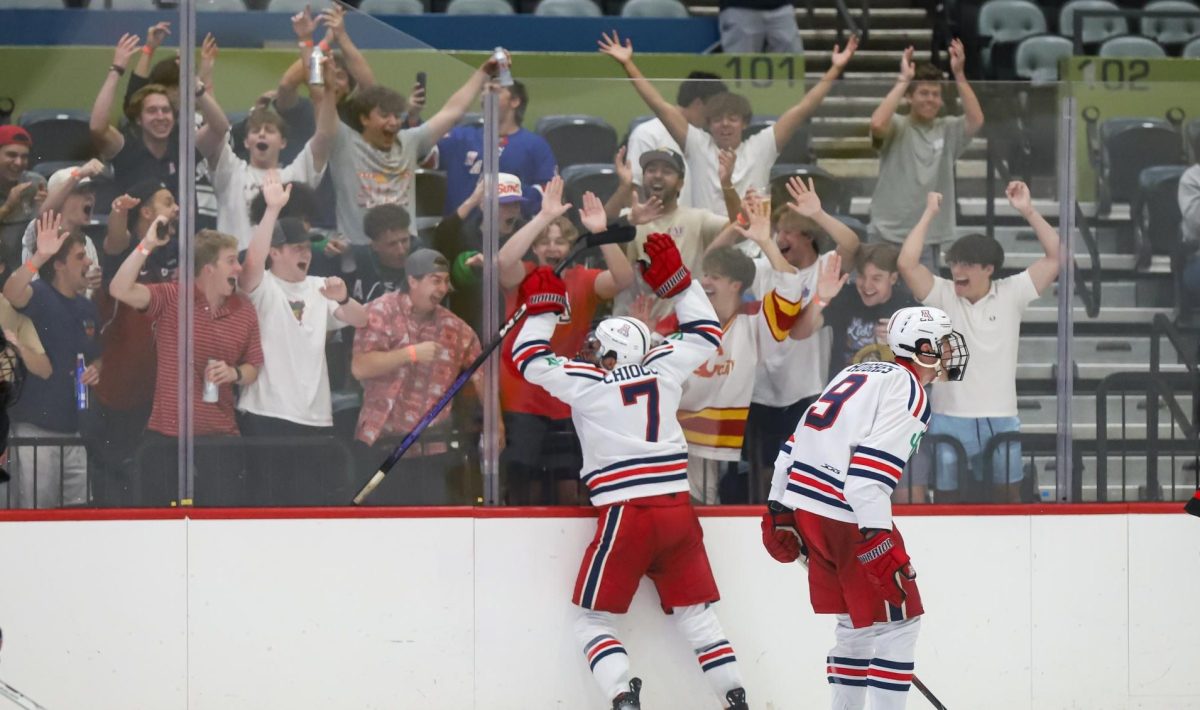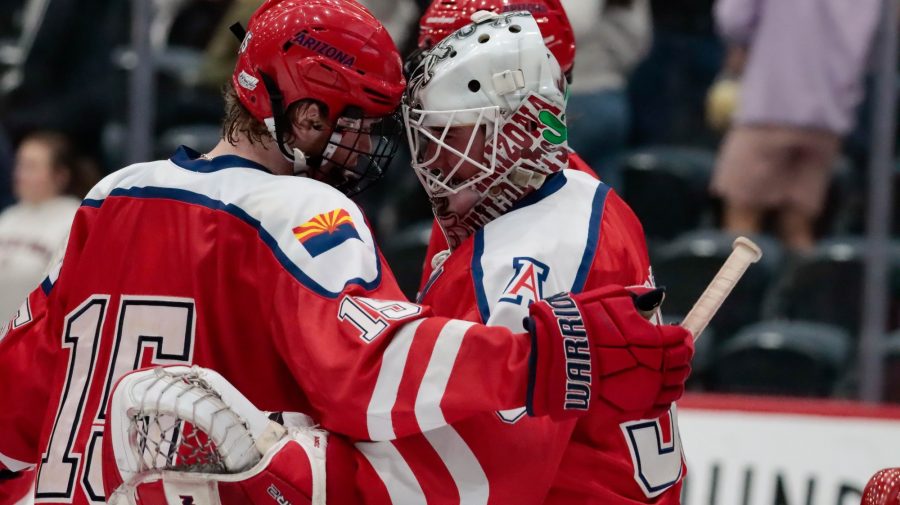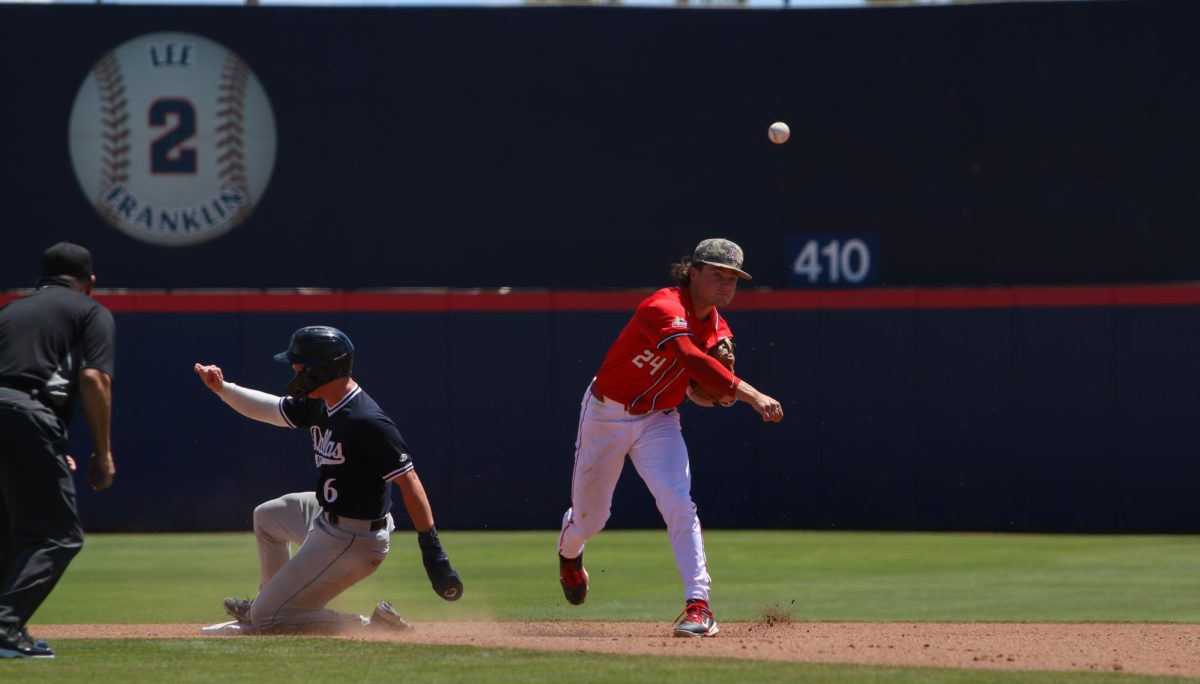It was just a few years ago that Mitch Stewart was finishing up his collegiate tennis career with the Washington Huskies. Today, he finds himself as a volunteer assistant coach for the Arizona men’s tennis team.
Stewart was a four-year tennis player at Washington from 2014-17, ranking as high as No. 57 in the International Tennis Association singles rankings. He posted some impressive achievements during his whole tennis career, which included being the 16 and under champion at the National Clay Court Championships in 2012 and finishing as a singles finalist at the same tournament in 2013. However, it was a different accomplishment that meant most to Stewart.
“In terms of actual accolades while playing, I was one of four Huskies to be first or second-team All-Pac-12 for all four years,” Stewart said. “That was pretty cool, but while I was at UW, I also won the Arthur Ashe sportsmanship award for the Northwest region and I think that is something to be very proud of, so I am very proud of myself for accomplishing that.”
Stewart played under head coach Matt Anger at Washington, who had a very impressive playing career that included achieving a singles ranking as high as No. 23 in the world on the ATP tour, as well as reaching the round-of-16 at both Wimbledon and the U.S. Open in 1986. From the Australian Open in 1983 till the Australian Open in 1988, there were only four Americans who won more Grand Slam singles matches in that time frame.
“[Anger] is one of the guys I respect most in this world,” Stewart said. “I love the guy to death. I can’t say a bad word about him if I tried… I had the time of my life there. I owe a lot of it to him. He is very by the book, but man he is just a great human being.”
The respect between the two of them was mutual, and Anger was quick to mention how hard Stewart worked throughout his four years at Washington.
“Coaching [Stewart] is always fun,” Anger said. “He was a guy that was talented to start with, but then also a hard worker and so he made a lot of improvements over the course of his career. I look back at the improvements he made, and I just had a great feeling about his game but also [Stewart] all together.”
Coming out of high school in Federal Way, Washington, Stewart was tabbed as a five-star Blue Chip recruit and a top-10 nationally ranked player by tennisrecruiting.net. There were a number of other Pac-12 schools that looked into Stewart out of high school, but Anger was confident that growing up in the Seattle area, Stewart always wanted to attend Washington.
“I think for us, [Stewart] had grown up wanting to be a Washington Husky, and so that helped,” Anger said. “He was a very good player so he was definitely somebody that we wanted, and I think it was one of those combinations where we were both hoping it would work out and it did.”
After graduating from Washington, Stewart had aspirations of trying to play professional tennis, but decided it was not the best move for him financially.
“I definitely wanted to,” Stewart said. “It’s very expensive for one, and two, I also had some nagging injuries that daunted me a little bit in college. It was just hard for me to decide whether or not it would be the right financial move to go out and do my best. I never actually got around to it, so I definitely regret it a little bit. I never gave myself a chance, but hey you know maybe there is still some time.”
Over the past few years, Stewart has bounced around from coaching junior tennis back in Washington to working in an office. It was at that point when Stewart knew that was not the job he wanted to do, and that was when he decided to connect with Arizona men’s tennis head coach Clancy Shields.
RELATED: Arizona men’s tennis team brings much-needed energy to make up for the lack of fans
Stewart and Shields have known each other for a while, and once Stewart heard that this job was open, he shot him a call and a text. Shields got back to him quickly, and the rest is history.
“I have known coach Shields for probably 10 or 15 years,” Stewart said. “I watched him growing up. He was an unbelievable player and I looked up to him a ton. He recruited me a little bit as well, so we’ve been mutual friends for a long time. I have tons of respect for coach Shields, and I think he likes the way I work hard so I think he has some mutual respect for me as well. Once I heard it was open, I shot him a call and a text, and he got back to me pretty quickly. I quit my job that day and drove down to Arizona, so this was kind of my first place I tried to call and it was the first one I got. I couldn’t have done it better though. I love this team. I love coach Shields. I love coach Bryce (Warren), so everything is perfect here for me.”
Being that he is still fresh out of college, Stewart is still able to use his youth and energy to hit and run with the players during practices. That does not go unnoticed by Shields.
“He is 25 years old, so he can go out and still beat up on most of the guys and play,” Shields said. “He brings a lot of experience and a lot of youthful energy, which is awesome for our program. I mean you watch him coach, and he might be running around the court more than any coach in the country. He brings a great bit of energy that we need, and he is going to be a top-notch coach very soon.”
Despite not being able to bring him in as a player, Shields was quick to bring in Stewart as an assistant coach prior to this season when the opportunity arose.
“It was one of those things where sometimes you work really hard to get players and coaches, and sometimes they fall into your lap,” Shields said. “This was one of those where I kind of told him the last time I saw him at the Pac-12’s, I said, ‘Hey man, tennis is a small world and our paths are going to cross, like keep me in the loop,’ and so he ended up calling me up in the summer and said I am done working this desk job, I want to come coach with you. I said, ‘Let’s do it man, we want you here,’ and every day since has been a blessing.”
Stewart played at a high level all four years while he was at Washington and Shields understands that he can relate to the players in the grind they are going through on a daily basis.
“When you played at a high level, you can coach at a high level because you have seen the game there,” Shields said. “That has been really nice to see him be able to step out immediately and coach the guys at a high level because he has played in all of those situations. He has played a lot of those same players that we’re going to be playing this year in our conference, so having that experience is invaluable. It means you have the ear of the players right away.”
Senior Filip Malbasic got to see how dominant of a player Stewart was firsthand, playing against him his freshman season. Malbasic reiterated how great the experience Stewart brings to the table has been for the whole team.
“I think he has been a huge asset to our team,” Malbasic said. “I think he brings a lot of energy and a lot of big heart to the team, but also most importantly he brings a lot of good experience. He has been in our shoes. He was a good junior player. He was one of the top college players. I played him when he played at Washington my freshman year, and just seeing what type of competitor he was, I think he can bring that to the court as well, but he also understands what we are going through and what kind of emotions.”
Malbasic reminisced back to the time when he got to play against Stewart in doubles and joked around about how tough it was to play against him.
“He absolutely destroyed me in doubles,” Malbasic said. “I remember him being a great teammate. He was a great leader for UW, and he was always bringing the energy and just being a great competitor.”
As he continues to roll through his first season of being an assistant coach for the Wildcats, Stewart hopes that his time and experience at Washington as a four-year player can benefit him in helping the Arizona players progress like he was able to.
“I think for me, just my recent four years of experience,” Stewart said. “I obviously went through all the trials and tribulations, so I think my experience is maybe slightly more relatable than the coaches just since I’m so recent out of school. I really saw it all, and I really saw my game develop from the time I became a freshman to the time I graduated my senior year.”
Stewart was not shy to credit his coaches at Washington in helping with his progression.
“I give a lot of credit to the UW coaches as well,” Stewart said. “I think they really developed my all-around game, and I think I know how to mentally succeed in an environment where you have school and all of these social things going on as well as your tennis. It is hard to balance all of that, so I think I bring a good perspective in regards to all of that.”
Follow Ari Koslow on Twitter



